

Can big banks catch up to Venmo with P2P payments app Zelle? Digital disruption has impacted just about every industry and one could make an argument that perhaps nowhere is the disruption more evident than in financial services.
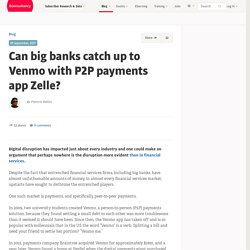
Despite the fact that entrenched financial services firms, including big banks, have almost unfathomable amounts of money, in almost every financial services market, upstarts have sought to dethrone the entrenched players. One such market is payments, and specifically, peer-to-peer payments. In 2009, two university students created Venmo, a person-to-person (P2P) payments solution, because they found settling a small debt to each other was more troublesome than it seemed it should have been.
Since then, the Venmo app has taken off and is so popular with millennials that in the US the word “Venmo” is a verb. Splitting a bill and need your friend to settle her portion? Today, Venmo processes tens of billions of dollars worth of payments per year and is still growing like a weed. So how does it stack up? How Two Brothers Turned Seven Lines of Code Into a $9.2 Billion Startup - Bloomberg. Every day, Americans spend about $1.2 billion online.

That figure has roughly doubled in the past five years, according to the Department of Commerce, and it’s likely to double again in the next five as the internet continues to devour traditional retail. So it might come as a surprise that the web’s financial infrastructure is old and slow. For years, the explosive growth of e-commerce has outpaced the underlying technology; companies wanting to set up shop have had to go to a bank, a payment processor, and “gateways” that handle connections between the two. This takes weeks, lots of people, and fee after fee. FinTech Australia releases fintech ecosystem map – FinTech Australia. Australia’s fintech industry body today released its first member ecosystem map, which helps build domestic and international understanding of the nation’s fintech strengths and diversity, particularly in wealth generation and lending.
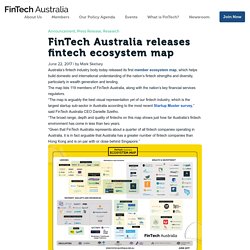
The map lists 119 members of FinTech Australia, along with the nation’s key financial services regulators. “The map is arguably the best visual representation yet of our fintech industry, which is the largest startup sub-sector in Australia according to the most recent Startup Muster survey,” said FinTech Australia CEO Danielle Szetho.
How financial services can keep up with the digital investor. Bank of Scotland, Halifax, Lloyds and Natwest have just announced over 200 branch closures collectively.
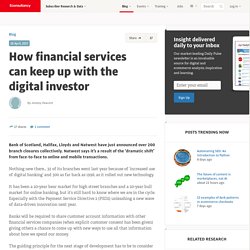
Natwest says it’s a result of the ‘dramatic shift’ from face-to-face to online and mobile transactions. Nothing new there... 32 of its branches went last year because of ‘increased use of digital banking’ and 300 as far back as 1996, as it rolled out new technology. Saving People Money. This past February, I wrote a post outlining my belief that a sure path to building an enduring, multi-billion dollar business was to build a “10x product, and save people money.”
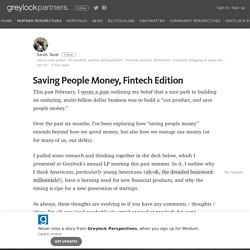
Over the past six months, I’ve been exploring how “saving people money” extends beyond how we spend money, but also how we manage our money (or for many of us, our debts). I pulled some research and thinking together in the deck below, which I presented at Greylock’s annual LP meeting this past summer. In it, I outline why I think Americans, particularly young Americans (uh-oh, the dreaded buzzword: millennials!) , have a burning need for new financial products, and why the timing is ripe for a new generation of startups. Nine Australian fintechs recognised as world leaders next to tech giants Stripe, Xero and Square - SmartCompany. Nine Australian businesses including Prospa, Tyro and Society One have been listed among the world’s leaders in fintech.

The annual Fintech 100 list, compiled by H2 Ventures and KPMG Fintech, ranks startups and established high-growth ventures from around the world in a top 50 established leaders category and a top 50 emerging stars category. Prospa founder and chief executive Beau Bertoli says it’s exciting to be one of the only Australian-focused fintech companies to be recognised among unicorn giants like Stripe, Square and Xero. “We’re the highest ranking Australian-only business and for us as a company, it’s really satisfying to be leading the charge for the Australian fintech community,” Bertoli tells StartupSmart.
$2B in Venture Capital money in Australia — find out who’s investing – Medium. Amended 19/10/2016 Five years ago, when I entered the local Australian venture scene, there were a handful of funds, active investors and few war stories of successful battles and losses with tech investments.
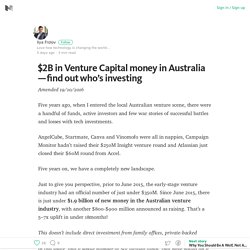
AngelCube, Startmate, Canva and Vinomofo were all in nappies, Campaign Monitor hadn’t raised their $250M Insight venture round and Atlassian just closed their $60M round from Accel. Five years on, we have a completely new landscape. Just to give you perspective, prior to June 2015, the early-stage venture industry had an official number of just under $350M.
Since June 2015, there is just under $1.9 billion of new money in the Australian venture industry, with another $800-$900 million announced as raising. This doesn’t include direct investment from family offices, private-backed venture firms, angel investors, angel-syndicates, private-equity firms that play in this space, and a whole number of SIV focused funds, that have bolted on a VC fund to be SIV-compliant. Trimantium Capital. Gateway. Apps-that-make-saving-as-effortless-as-spending. Why forcing banks to open data will trump portable payments. By Taleen Shamlian The parliamentary inquiry into the four major banks threw up several ways to make Australia's financial service and payments infrastructure more competitive.

The most widely reported were account number portability and mandating open access to data. The Economics Committee's chair, Liberal member David Coleman, favoured these proposals to allow customers to have more power over their banks and switch lenders more easily. Australia is not alone in this: similar reforms are currently being considered in Britain. However, the introduction of these reforms is complicated and we should carefully evaluate Britain's success before doing the same. Fintech start-ups put banks under pressure. Table football, comfy sofas, book shelves and exposed brick walls suggest a contemporary café rather than an insurance office or bank branch.

But such trendy spaces are increasingly part of the financial sector’s push to foster financial technology or fintech projects. Sample the FT’s top stories for a week You select the topic, we deliver the news. Satan's Credit Card: What The Mark Of The Beast Taught Me About The Future Of Money - BuzzFeed News. Satan's Credit Card: What The Mark Of The Beast Taught Me About The Future Of Money - BuzzFeed News. Fintech threatens Australia’s biggest banks. Six tips for early-stage fintechs from an Aussie investor - StartupSmart. To borrow a much-overused phrase from the Australian government, there has never been a more exciting time to be an Australian, particularly if you’re a fintech founder.

The Australian government has caught up with the transformative impact fintech could have on our financial system and economy and recently announced a raft of initiatives to boost Australia’s fintech activity and help make it more competitive internationally. While many of these initiatives, particularly those that will relieve some of the regulatory burden, are long overdue, they have been welcomed by the fintech community. Fintech founders who are just getting started will face an easier journey than older startups but even with these improvements, early-stage fintech founders will increase their chances of success if they follow these six tips. 1. Focus on your niche The most successful fintech innovators have tremendous focus on a niche in the value chain. 2. 3. 4. Non-bank lenders making in-roads in SME market but challenges remain - SmartCompany.
The Scottish Pacific SME Growth Index highlights two significant trends in how SMEs are financing their businesses. Firstly, the big four bank stranglehold on the SME segment is loosening with non-bank lenders starting to make inroads. Of the businesses surveyed by Scottish Pacific, 32.1% of SMEs borrow directly from their main relationship bank, down from 38.6% last year. Global investment in fintech hits $20 billion as the Australian ecosystem continues to grow - StartupSmart. Global investment in fintech startups hit nearly $20 billion last year, with major institutions and banks becoming increasingly willing to work with their potential disruptors, a new report finds. The total investment in fintech including debt and equity reached nearly $20 billion last year, according to The Pulse of Fintech report by KPMG and CB Insights.
Investment into VC-backed fintech companies more than doubled from 2014 to 2015 with nearly $14 billion spent on 653 deals. Driving this interest are fintechs offering solutions in lending, payment, block chain and bitcoin, Pollari says. The CEO of MoneyBrilliant on why she's leaving the startup after its big buyout - StartupSmart. Jemma Enright is the co-founder and CEO of MoneyBrilliant, a startup that was this week wholly acquired by AMP New Ventures.
In this piece, Enright reflects on her journey building the startup and why she has decided to leave. Four years ago my good friend, Peter Lord, presented a rough PowerPoint to me that he believed would change the world. It was an idea for a startup business that would have a significant impact on the terrible statistics showing the number of people experiencing financial distress. Peter’s mum had experienced the anxiety that comes with realising you’ve made the wrong decisions financially and missed opportunities that would have set you up well for retirement. This fintech startup wants to take the stress away from financial planning - StartupSmart. A Sydney fintech on a mission to make personal finance more accessible foreveryone has securedmore than 1000 users after three months of beta testing. With as few as one in five people having access to personal financial advice, Map My Plan founder Paul Feeney says the startupwill make personalised planning more transparent and available.
“We want to make sure that people have the right information at the right time to make well-informed financial decisions,” Feeney tells StartupSmart. Feeneysays theirfinancial planning platform enablesusers to navigate and create roadmaps to manage debt, deposits and savings for retirement or emergencies. Cash flow is king as technology changes the way SMEs will do their banking. Small business owners, banks and fintechs can all gain valuable insights from a recent survey of SMEs conducted by research company Digital Financial Analytics (DFA). The results reinforce the critical importance of cash flow management and identify a number of telling behavioural and demographic trends within this all important sector. Westpac pilots SME lending with fintech Prospa. Prospa CEO Beau Bertoli is working on a proof of concept. Invoice2go ready to go into SME mobile payments. Invoicing startup Invoice2go has closed a $15 million series C funding round that will be used to help it move into the mobile payments space.
The round was led by Ribbit Capital, and included participation Accel Partners. Both were existing investors. The startup raised $35 million in series A and B rounds, announced in September last year. While Invoice2go founder Chris Strode wouldn’t disclose the startup’s valuation, he says it wasn’t a down round. Innovation - Xeroing in on the power of disruption. Growth - Clover’s robo-advisor has a super ally.
Why disruptive lenders could spell danger for SMEs. The emergence of “disrupters” to established business models over recent years has had a significant impact on our society and economy. Uber and Airbnb have completely changed the taxi and travel industries in a very short time, inspiring other “disrupters” in other fields. NAB to offer computerised financial advice to bank customers. NAB's general manager of digital and direct services, Anne Bennett, says the bank plans to make advice available to more customers. Fintech In the Room With Banks, Literally, and Smelling Blood - MoneyBeat.
Stone & Chalk names resident start-ups. By James Eyers. AFG to offer SME loans from cashflow lender Prospa. By Shaun Drummond. $2b fee sticking point as Apple wrangles with Australia's big four banks. Apple is finding it hard to win a slice of the big banks' payment fees. Square prepares for a bite of Australian contactless payments. Technology - 10 areas of financial services in dire need of innovation. Technology - Stripe ripe for Apple Pay boom. Banks shadow box with online business lenders. Technology - 10 areas of financial services in dire need of innovation. Innovation - Straight-talking ANZ CTO Patrick Maes signals bank’s intent to partner with more Aussie fintech startups.
Banking sector challenges: fintech disruption and falling customer experience ratings. Robo-adviser Stockspot raises capital from H2, Rocket Internet. How HDFC Bank's digital drive is helping the bank outpace its competitorsDATAQUEST. Econsultancy. ?tag=nl. ?tag=nl. Fintech hub Stone & Chalk names Alex Scandurra as CEO with big plans to disrupt banking. Sydney’s fintech scene just got another leg-up with the launch of a new co-working space. Growth - Algorithms and robots the future of financial advice, but startup barriers loom large. Communications tech startup Tapit partners with security giant Gemalto. Www.accenture.com/SiteCollectionDocuments/PDF/Accenture-Bank-of-Things.pdf.